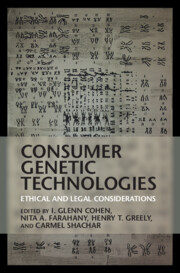Book contents
- Consumer Genetic Technologies
- Consumer Genetic Technologies
- Copyright page
- Contents
- Contributors
- Acknowledgments
- Introduction
- Part I Consumer Genetic Technologies: Rights, Liabilities, and Other Obligations
- Part II Privacy in the Age of Consumer Genetics
- Introduction to Part II
- 6 Noninvasive Prenatal Genome Sequencing
- 7 The Myth of “Anonymous” Gamete Donation in the Age of Direct-to-Consumer Genetic Testing
- 8 Improving Commercial Genetic Data-Sharing Policy
- 9 Genetic Paparazzi
- Part III Tinkering with Ourselves: The Law and Ethics of DIY Genomics
- Part IV Consumer Genetics and Identity
- Part V The Impact of Genetic Information
8 - Improving Commercial Genetic Data-Sharing Policy
from Part II - Privacy in the Age of Consumer Genetics
Published online by Cambridge University Press: 27 August 2021
- Consumer Genetic Technologies
- Consumer Genetic Technologies
- Copyright page
- Contents
- Contributors
- Acknowledgments
- Introduction
- Part I Consumer Genetic Technologies: Rights, Liabilities, and Other Obligations
- Part II Privacy in the Age of Consumer Genetics
- Introduction to Part II
- 6 Noninvasive Prenatal Genome Sequencing
- 7 The Myth of “Anonymous” Gamete Donation in the Age of Direct-to-Consumer Genetic Testing
- 8 Improving Commercial Genetic Data-Sharing Policy
- 9 Genetic Paparazzi
- Part III Tinkering with Ourselves: The Law and Ethics of DIY Genomics
- Part IV Consumer Genetics and Identity
- Part V The Impact of Genetic Information
Summary
Hundreds of genetic data-sharing agreements between industry, nonprofits, and academia already exist– scientists predict that almost 60% of European-descent individuals have a blood relative in a genetic database. There is much good that can come from being able to analyze and share genetic data resources at this scale, and many recent scientific advances have been founded in both private and private/public collaborations. But there is a tension between allowing consumers autonomy to access genetic and health information directly, while contractually accepting related terms and conditions, and protecting them against a lack of clarity and transparency in the commercial genetic data research industry. Major direct-to consumer personal genetic testing companies and the Future of Privacy Forum recently released Privacy Best Practices for Consumer Genetic Testing Services. This article argues that privacy best practice standards will be a major area for improvement in the coming years. Additional improvements must be made to buttress both clarity and transparency in such policy for comprehensive governance of this vital research resource.
- Type
- Chapter
- Information
- Consumer Genetic TechnologiesEthical and Legal Considerations, pp. 107 - 112Publisher: Cambridge University PressPrint publication year: 2021



